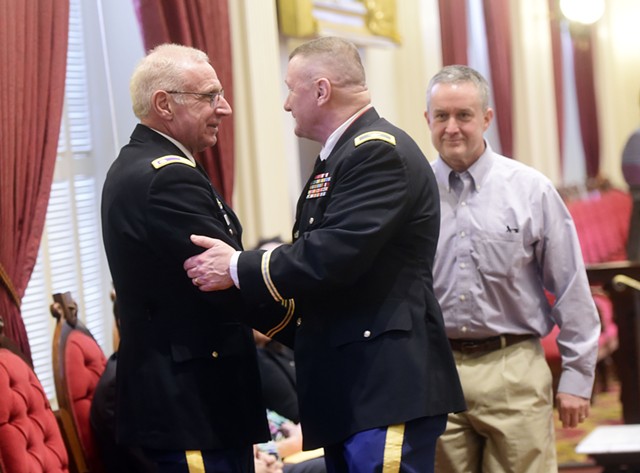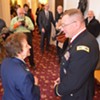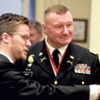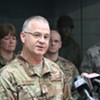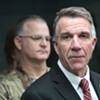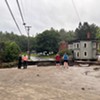Switch to the mobile version of this page.
Vermont's Independent Voice
- News
- Arts+Culture
- Home+Design
- Food
- Cannabis
- Music
- On Screen
- Events
- Jobs
- Obituaries
- Classifieds
- Personals
Browse News
Departments
Browse Arts + Culture
View All
local resources
Browse Food + Drink
View All
Browse Cannabis
View All
-
Business

Cannabis Company Could Lose License for Using…
-
Culture

'Cannasations' Podcaster Kris Brown Aims to 'Humanize'…
-
True 802

A Burlington Cannabis Shop Plans to Host…
-
Business

Judge Tosses Burlington Cannabiz Owner's Lawsuit
-
Health + Fitness

Vermont's Cannabis Nurse Hotline Answers Health Questions…
Browse Music
Browse On Screen
Browse Events
View All
Quick Links
Browse Classifieds
Browse Personals
-

If you're looking for "I Spys," dating or LTRs, this is your scene.
View Profiles
Special Reports
Pubs+More
Tuesday, February 5, 2019
Military / Statehouse Adjutant General Candidates Pledge to Confront Sex Harassment in Vermont National Guard
Posted By Kevin McCallum on Tue, Feb 5, 2019 at 10:34 PM
The four candidates seeking to be the next leader of the Vermont National Guard outlined Tuesday how they would combat sexual harassment and discrimination within the organization, create a culture of accountability and regain the public’s trust.
The hearing before a joint committee of the state general assembly was the first time each candidate had publicly explained why legislators should pick him or her to lead Vermont's 3,400-strong force of active duty and part-time soldiers.
David Baczewski, a retired Air Guard brigadier general and resident of Westford, was perhaps the most blunt in describing the Guard’s shortcomings around sexual assault and discrimination, the subject of intense media scrutiny of late. A series of stories published last November by VTDigger.org described instances of alleged alcohol abuse, cronyism, sexual harassment and retaliation against a whistleblower.
“We do not foster an inclusive work environment free from discrimination and harassment,” Baczewski said. “I think a lot of people are trying hard. We have good programs. But the answer is no. Discrimination and harassment, including sexual assault, sexual harassment, sex-based gender discriminations — including the LGBT community — exists. That’s a fact. It’s an unacceptable fact.”
“We can’t be afraid to be bold to advance gender equality,” he told members of the House Committee on General, Housing and Military Affairs, and the Senate Committee on Government Operations.
Baczewski proposed hiring a gender equality advisor — which he said would be a director-level position — partnering with the Vermont Commission on Women, and creating a “cross-cultural council” to advise the guard.
As a human resources officer in the Vermont National Guard, Col. Greg Knight said it is his job to know when there are reports of sexual assault and discrimination, so he's aware that it happens.
But just as important as the reported incidents are the unreported ones, he said.
“Those victims, those survivors have to carry that emotional stress with them, and one transgression is too many. It erodes trust in our organization, and it certainly impacts our readiness,” Knight said.
If elected to the post, the Huntington resident said his first order of business would be to meet with every woman in the organization, something he said that, given the recent bad press, would be “a pretty logical place to start.”
Knight's goal would be to “create a culture of dignity and respect for everybody” by making sure that everyone in the organization, regardless of rank, feels empowered to speak up in the event they witness something inappropriate.
“The way you address that is by making sure that the folks who don’t have the authority understand that they have the responsibility and feel comfortable enough to come forward to tell those who have the authority to do something about it,” Knight said.
When women are in positions of authority in the military, the instances of sexual assault and harassment drop, Knight said. But the Guard got caught in something of a “vicious cycle” because of how few women have been promoted to those positions, he said.
Knight said he would look to and learn from other states and the best practices they’ve adopted. In particular, he’d establish a provost marshal position within the Guard, which he said would be a military law enforcement liaison.
As for leaders who weren’t up for the task of changing the culture, Knight said the only way to handle such situations is to be “professionally candid.”
“If there are leaders who are poor leaders or not the example we’re looking for ... I would ask [that they] find something else to do,” he said.
The most recent entrant into the adjutant general race is Rosanne Greco, a retired Air Force colonel and fierce critic of the decision to base the new F-35 fighter in South Burlington, where she has previously served on the city council.
Rep. Tom Stevens (D-Waterbury), chair of the House Committee on General, Housing and Military Affairs, asked Greco how she expected to be an effective leader for an organization charged with flying and maintaining the F-35 given that she’s been such a vocal opponent of it.
Greco, who worked on denuclearization efforts during her military career, questions the fighter’s safety record, the impacts of the noise around Burlington International Airport and the health risks of working around aircraft made of dangerous composite materials.
“I’d speak truth to power, but in the end, they are the decision makers,” Greco said. “I would salute smartly, and I would carry on.”
She said she would do so, however, with a better understanding of the issues than others who might not have read the entire 6,000-page environmental report about the F-35's impacts.
“I would keep a closer eye on it because I’m a skeptic, and I’d make sure there are no corners cut,” she said.
As for equity issues, Greco said has experienced plenty of sexism during her career, but was “always able to navigate it.”
“I have seen many positive changes for women in the military over my 30 years,” she said. “However, recently there have been a lot of reports … that show we are backsliding.”
David Graham, a retired Army lieutenant colonel from Grand Isle, took a more meandering, narrative approach during his testimony.
He described studying alternative energy in Vermont as a young man when he was drawn to the idea of helping people in emergency situations such as floods.
“So I shaved my beard and cut my ponytail and signed on the dotted line,” Graham recalled of joining the Guard.
He described a number of memorable events of his career, including teaching ROTC students at UVM, delivering humanitarian goods to Afghanistan, and helping that war-torn country develop sustainable economic and agricultural practices.
Graham also said he had personally dealt with medical issues in the service and would be able to bring that experience to bear to help soldiers dealing with similar issues.
Graham spent little time addressing gender issues, though he did note that he has several supporters with years of experience in the Guard, many of whom are women.
“You’re not just getting me,” he said. “You’re getting 200 years of very real experience coming with me that I’ll rely on to be successful.”
Tags: Vermont National Guard, adjutant general, Rosanne Greco, Greg Knight, David Graham, David Baczewski, Statehouse, Image, Web Only
Comments (4)
Showing 1-4 of 4
Comments are closed.
Since 2014, Seven Days has allowed readers to comment on all stories posted on our website. While we’ve appreciated the suggestions and insights, the time has come to shut them down — at least temporarily.
While we champion free speech, facts are a matter of life and death during the coronavirus pandemic, and right now Seven Days is prioritizing the production of responsible journalism over moderating online debates between readers.
To criticize, correct or praise our reporting, please send us a letter to the editor. Or send us a tip. We’ll check it out and report the results.
Online comments may return when we have better tech tools for managing them. Thanks for reading.
Related Stories
About The Author

Kevin McCallum
Bio:
Kevin McCallum is a political reporter at Seven Days, covering the Statehouse and state government. He previously was a reporter at The Press Democrat in Santa Rosa, Calif.
Kevin McCallum is a political reporter at Seven Days, covering the Statehouse and state government. He previously was a reporter at The Press Democrat in Santa Rosa, Calif.



























